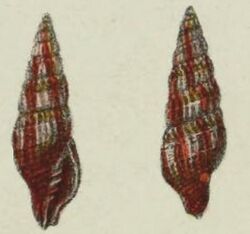Biology:Vexillum lincolnense
| Vexillum lincolnense | |
|---|---|

| |
| Shell of Vexillum lincolnense (holotype) | |
| Scientific classification | |
| Kingdom: | Animalia |
| Phylum: | Mollusca |
| Class: | Gastropoda |
| Subclass: | Caenogastropoda |
| Order: | Neogastropoda |
| Superfamily: | Turbinelloidea |
| Family: | Costellariidae |
| Genus: | Vexillum |
| Species: | V. lincolnense
|
| Binomial name | |
| Vexillum lincolnense (Angas, 1878)
| |
| Synonyms[1] | |
| |
Vexillum lincolnense is a species of sea snail, a marine gastropod mollusk, in the family Costellariidae, the ribbed miters.[1]
Description
The length of the shell attains 13.4 mm.
The solid shell is acuminately fusiform. It is whitish, tinged with irregular longitudinal chestnut flames, with a narrow band of interrupted spots, encircling the centre of the whorls. The lower half of the body whorl is chestnut, with a faint band of reticulated brown and white spots in the middle. The shell contains seven whorls, a little convex with numerous, stout, rounded longitudinal ribs which are slightly nodulous below the sutures. The interstices are smooth. The sutures are impressed. The spire is longer than the aperture. The outer lip is simple and a little contracted below. The columella has four strong plaits, the posterior one the largest. The siphonal canal is short and slightly recurved. [2]
Distribution
This marine species is endemic to Australia and occurs off South Australia and Western Australia
References
- ↑ 1.0 1.1 MolluscaBase (2018). Vexillum lincolnense (Angas, 1878). Accessed through: World Register of Marine Species at: http://www.marinespecies.org/aphia.php?p=taxdetails&id=591508 on 2018-12-31
- ↑ Angas, G. F. (1878). Descriptions of nine new species of land and marine shells from various localities. Proceedings of the Zoological Society of London. (1878): 310-318, pl. 18
 This article incorporates text from this source, which is in the public domain.
This article incorporates text from this source, which is in the public domain.
External links
Wikidata ☰ Q7924067 entry
 |
